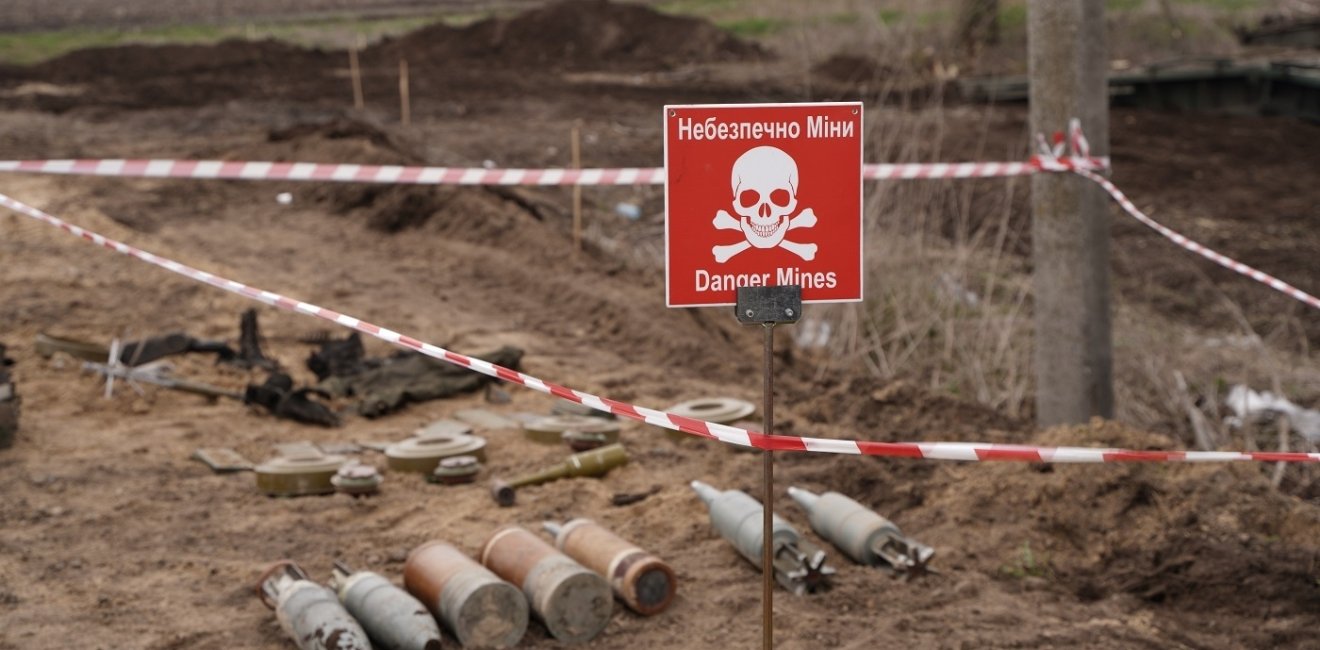
A blog of the Kennan Institute
Ukraine's fertile soil, known as chernozem, has underpinned generations of farmers; vast farmlands have long been Ukrainians’ pride. This agricultural prowess has not only fed Europe, it has also shaped Ukraine's economy and culture.
Today these lands are marred by the harsh realities of war. Land mines and unexploded ordnance hide beneath the ground, posing grave risks to people and hindering refugees from returning. The pressing need to clear these lands is not just a humanitarian concern but also an economic imperative.
Despite President Zelensky’s commitments in his ten-point peace plan to safeguarding Ukraine's food security and environment, the matter of land contamination remains a significant issue, with no concrete solutions available to date.
With the war now settling into a less dynamic phase, there is opportunity to address the challenge of reviving the productivity of Ukraine’s reclaimed lands while ensuring the safety of the country’s farmers. At the top of the list of concerns in this regard is demining.
According to Ukraine’s Ministry of Foreign Affairs, about 30 percent of Ukraine’s total land area has been mined. While Ukrainian businesses and foreign investors have already proposed using the contaminated agricultural land creatively, none of the proposals has quite recognized the magnitude of the problem of demining or how demining on a large scale is to be achieved.
Demining Requires International Cooperation
The history of major conflict clean-ups in the twentieth century underscores the pivotal role of international cooperation in demining. Following World War II, Europe embarked on the task of clearing millions of landmines, with such countries as France, Belgium, and Germany contributing manpower to this effort.
In Afghanistan, since the 1979 Soviet invasion and ongoing conflicts, such groups as UNMAS (United Nations Mine Action Service) and the Halo Trust have led demining efforts, yet significant areas remain at risk. Cambodia has also witnessed substantial progress in mine clearance since the 1990s, thanks to the collective efforts of NGOs and the UN.
During the Yugoslav Wars in the 1990s, NATO and EU countries played crucial roles in demining as part of wider peacekeeping missions.
Ukraine’s Legal Affordances
Ukraine's legal framework provides a relatively clear process for involving foreign entities in the demining process. The landmark law is Ukrainian Law On Mine Counteraction in Ukraine, or the MCU Act. It defines the legal and organizational principles for conducting mine action and specifies roles for the state and nonstate entities in regulating this sphere.
The key elements of the MCU Act that touch on international cooperation are two:
—Identifying the mine counteraction operators (MCOs) as entities authorized to carry out tasks in this field, including international and foreign organizations.
—Outlining the state regulation and management in the field of mine action, which involves formulating and implementing national mine action programs, developing national standards based on international standards, ensuring quality control and information management in mine action, and, finally, maintenance of the MCO database.
The MCU Act further establishes the criteria for entities to become MCOs and details the kinds of international technical assistance permitted, including charitable and other types of aid. It establishes that international cooperation in mine action is to be facilitated by the National Authority on Mine Counteraction (NAMC) through the Ministry of Foreign Affairs of Ukraine, including the implementation of joint projects, international assistance for capacity building in demining, and information exchange systems.
The NAMC’s operational basis is laid out in the Resolution of the Cabinet of Ministers of Ukraine On the Establishment of the National Authority on Mine Counteraction.
Notably, NAMC’s leadership predominantly comes from the ranks of military officials, including the minister and deputy minister of defense, suggesting a heavily militaristic approach to mine action. This structure is further cluttered with deputies from various ministries, while Ukraine’s Security Service—contingent on agreement—adds a layer of intelligence oversight, raising concerns about excessive security influence. Overall, the NAMC's composition raises concerns about its potential for bureaucratic entanglements.
The MCO database is held and operated by NAMC on the basis of RCMU No. 1150, dated November 3, 2021.
Interestingly, the authorities of the NAMC were defined after regulations regarding the MCO were passed, which contradicts both the usual flow of legislative process and formal logic. Despite the resulting lack of clarity on certification procedures and which entity should issue compliance certificates, the ongoing successful application and certification of MCOs demonstrate the potential for effective implementation of these measures.
From Mines to Vines: A Collaborative Approach
To ensure stable growth of the agricultural sector, Ukrainian authorities must create transparent and inclusive processes for demining, in this way fostering an environment familiar to the allies.
Western defense contractors with significant global influence and expertise would then be more encouraged to support Ukraine's demining efforts.
The next task for Ukraines legislative branch is engagement of these defense contractors in all stages of the demining process. This, in turn, will ensure alignment with international best practices and prioritize the restoration of the agricultural sector, the development of new economic opportunities, and the well-being of Ukrainian citizens.
Through unified efforts, Ukraine can reclaim its agricultural legacy, ensuring a secure and prosperous future for its people.
The opinions expressed in this article are those solely of the author and do not reflect the views of the Kennan Institute
Author


Kennan Institute
After more than 50 years as a vital part of the Wilson Center legacy, the Kennan Institute has become an independent think tank. You can find the current website for the Kennan Institute at kennaninstitute.org. Please look for future announcements about partnership activities between the Wilson Center and the Kennan Institute at Wilson Center Press Room. The Kennan Institute is the premier US center for advanced research on Eurasia and the oldest and largest regional program at the Woodrow Wilson International Center for Scholars. The Kennan Institute is committed to improving American understanding of Russia, Ukraine, Central Asia, the South Caucasus, and the surrounding region through research and exchange. Read more

Explore More in Focus Ukraine
Browse Focus Ukraine
Talking to the Dead to Heal the Living

Ukrainian Issue in Polish Elections


